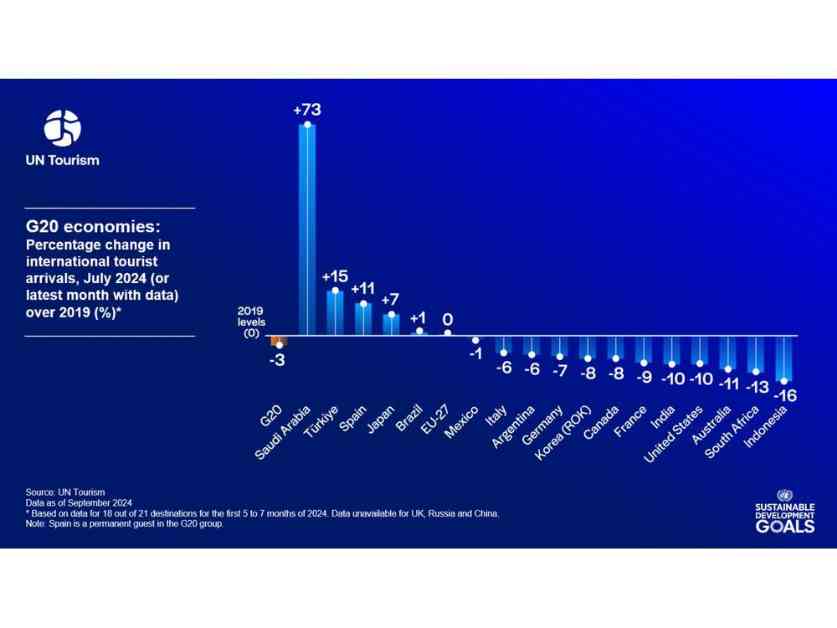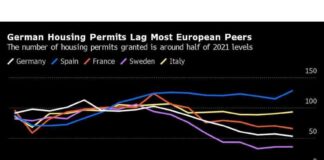Saudi Arabia Leads G20 Countries in Tourism Growth, According to Latest UN Tourism Report
In a recent report by the UN World Tourism Barometer, Saudi Arabia has emerged as the fastest-growing G20 country in terms of tourism growth. The report highlights a remarkable 73% increase in international tourist arrivals to Saudi Arabia in the first seven months of 2024 compared to the same period in 2019. This significant growth reflects the success of the Kingdom’s ambitious tourism strategy under Vision 2030.
The UN World Tourism Barometer serves as a global benchmark for measuring tourism sector performance, and its latest findings underscore Saudi Arabia’s impressive achievements in both visitor numbers and economic impact. The Kingdom’s robust visa facilitation program, including the expansion of its e-visa scheme, has played a crucial role in attracting millions of international tourists and enhancing Saudi Arabia’s connectivity with the world.
Saudi Arabia’s investment in transformative projects such as the Red Sea Project, NEOM, and Diriyah has been instrumental in driving its tourism growth. These giga-projects are reshaping the global tourism landscape and solidifying Saudi Arabia’s reputation as a premier destination for travelers seeking world-class experiences.
Vision 2030, Saudi Arabia’s long-term economic diversification plan, has prioritized tourism as a key sector for growth. With the Kingdom welcoming 109 million tourists in 2023, Saudi Arabia is on track to achieve its goal of attracting 150 million annual visitors by 2030. Tourism is expected to represent 10% of the Kingdom’s GDP, with the sector creating one million new jobs and increasing the total workforce to 1.6 million.
The UN report also recognizes Saudi Arabia’s efforts in driving international tourism recovery post-pandemic through collaborative initiatives between governments, the private sector, and global investors. The Kingdom’s focus on sustainable tourism, responsible development, and regional connectivity has garnered recognition from key global tourism bodies such as the UN Tourism and the World Travel & Tourism Council (WTTC).
With sustainability at the forefront of its tourism strategy, Saudi Arabia is committed to responsible development that preserves its natural and cultural heritage while meeting the needs of its growing tourism sector. The Ministry of Tourism continues to work closely with international organizations and stakeholders to ensure that tourism growth aligns with the UN’s Sustainable Development Goals (SDGs), fostering an industry that benefits both local communities and visitors.
Saudi Arabia’s success story serves as a model for other destinations looking to enhance their tourism offerings. The Kingdom’s innovative approach, focus on sustainability, and investment in large-scale tourism infrastructure demonstrate how visionary planning, strategic investment, inclusive policies, and global collaboration can drive growth even in a competitive international landscape.
The Ministry of Tourism (MT) in Saudi Arabia, established in 2000, plays a pivotal role in championing long-term growth in the Kingdom’s tourism industry. Committed to realizing the Kingdom’s vision for tourism, MT collaborates with government entities, industry stakeholders, and the public and private sectors to drive sustainable tourism growth through forward-thinking policies, targeted investments, and talent development initiatives. With a strategy rooted in Arabian authenticity and powered by data, MT aims to make Saudi Arabia a hub for unforgettable tourism experiences.
In conclusion, Saudi Arabia’s position as the fastest-growing G20 country in tourism underscores its commitment to becoming a global tourism destination. Through strategic planning, investment in transformative projects, and a focus on sustainability, the Kingdom is paving the way for inclusive growth, job creation, and environmental stewardship in the tourism sector. Saudi Arabia’s success is a testament to the power of visionary leadership and collaboration in driving tourism growth on a global scale.






















